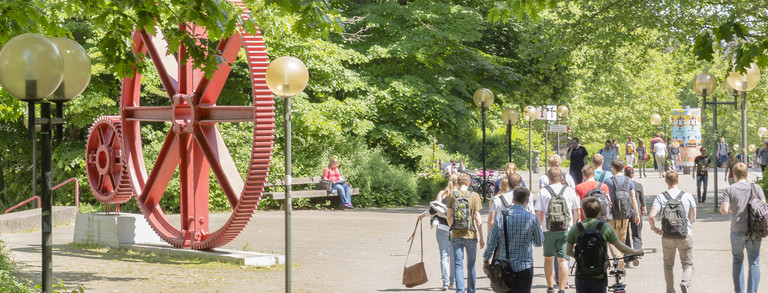The history of "corporate taxation" at the TU Dortmund over five decades
After the founding of the University of Dortmund on December 16, 1968 and the (then) Department (later Faculty) of Economics and Social Sciences on April 1, 1973, Dr. Siegfried Hummel was appointed "Wissenschaftlicher Rat und Professor" by the Seminar für Verkehrsbetriebslehre (Professor Dr. Dr. h.c. Paul Riebel) at the Goethe University in Frankfurt/Main on October 1, 1975 and entrusted with the management of the new "Fachgebiets Betriebswirtschaftslehre". In addition to various courses on general business administration, he held lectures on "Investment and Financing" and "Sales Management" in the following semesters. Starting in the summer semester of 1976, he successively built up the new elective subject "Taxation".
The lecture on Friday, April 30, 1976 thus marks the actual birth of "Corporate Taxation" at the (now) Technical University of Dortmund.
Initially, the department was provisionally housed in premises at Rheinlanddamm 203, not far from the Westfalenhallen. In the spring of 1976 - together with the (then) Chair of Manufacturing Economics (Professor Dr. Wolfgang Männel, coming from the same chair in Frankfurt, moved to the Friedrich-Alexander-University Erlangen-Nuremberg in 1983) - the department moved to the 2nd floor of the just completed building Chemie 1 on the so-called main construction area (today Campus North). It was located there until the retirement of Professor Hummel in summer 2003.
In the 1980s, the courses in the diploma program in economics were "Taxation I: Introduction", "Taxation II: Income Taxes", "Taxation III: Tax Balance Sheets", "Taxation IV: Value Added Tax" and - in part - "Case Studies in Taxation". In the 1990s, the courses were reorganized with the significant participation of the then research assistants Carsten Theile (later professor at the universities of Hof and Bochum) and André Jungen (see below). Tax Theory I was supplemented by Income Tax, Tax Theory II and III were combined to form "Profit Determination and Profit Taxation", Tax Theory IV became Tax Theory III, and a completely new course was created, "Tax Theory IV: Business Tax Policy". The course offerings were supplemented by a "Practical Colloquium on Taxation".
The diploma examinations in the elective subject of taxation consisted of a four-hour written examination and an oral examination of about 30 minutes. The lecture "Steuerlehre I" was at the same time one of five components of the likewise four-hour written exam in the compulsory subject "Allgemeine Betriebswirtschaftslehre".
In 1993, the department was renamed "Department of Business Administration / Taxation", which was long overdue due to the established content orientation. In the summer of 2003 - after the retirement of Professor Hummel - the department moved to the first floor of the so-called Schumpeter Pavilion in front of the Chemistry Building and remained there for almost exactly ten years. At the same time, the dean at the time, Professor Dr. Hartmut Neuendorff, entrusted André Jungen, who had in the meantime received his doctorate and been appointed as a tax advisor, with the administration of the department. This was accompanied by his tenure and appointment as an academic councilor.
Almost two years later, on April 1, 2005, Dr. Matthias Wolz, who had come from the University of Wuppertal, was appointed university professor. He thus took over the overall management of the teaching unit, which was upgraded by the faculty to the "Chair of Corporate Taxation and Auditing". The rector, Professor Dr. Dr. h.c. Ursula Gather, entrusted Dr. André Jungen, who has now been promoted to senior academic councillor, with the management of the "Corporate Taxation Department" within the chair. This ensured continuity in this area despite the restructuring carried out by the Faculty of Economics and Social Sciences. A short time later, the chair was renamed "Auditing and Corporate Taxation". Also renamed in 2007 was the university itself, which was henceforth called "Technische Universität Dortmund".
Starting with the winter semester 2007/08, the previous diploma to bachelor and master programs were smoothly converted, which also required a change in the course modules. From then on, the bachelor's program consisted of the four-hour modules "Corporate Taxation I: Fundamentals of Taxation and Tax Accounting" and "Corporate Taxation II: Income Taxes", supplemented by a seminar. In the master's training, until 2011 there was sales tax in a combined basic module "Auditing and Corporate Taxation". Initially, the Bachelor modules were both concluded by a 90-minute written exam; since 2012, the income tax module has ended with a 20-30 minute oral exam.
In July 2011, Professor Wolz moved to the University of Trier, and Dr. André Jungen, in the meantime appointed Academic Director, was entrusted with the administration of the Chair by the then Dean, Prof. Dr. Wolfgang Schünemann. On April 1, 2013, the teaching unit was split into the Chair of International Accounting and Auditing and the Chair of Corporate Taxation. The newly created WP chair was filled by Professor Dr. Christiane Pott, who had come from the Institute of Corporate Accounting and Taxation (Professor Dr. Christoph Watrin) at the Westfälische Wilhelms-Universität Münster. Both teaching units moved into the newly built seminar room building I, the teaching unit Corporate Taxation together with the Dean's Office moved to the 2nd floor. The move of the dean's office is also symbolic for the reorientation of the faculty initiated during this time, which culminated in the renaming to "Faculty of Economics" in May 2017, combined with the elimination of the sociological chairs.
As a consequence of the chair vacancy and the subsequent split, in the Master's education the previous combined module was transformed into a module with a lecture on sales tax and a seminar in the winter semester 2012/13. Finally, since the winter semester 2015/16, there is the module "Corporate Taxation I" with lectures on VAT (completion by oral examination) and on International Taxation (completion by 60-minute written examination) as well as the seminar module "Corporate Taxation II" (completion by term paper + presentation + co-presentation). Additional incentives for the students are the PwC award for the best thesis, the so-called "DATEV driving license" and regular guest lectures.

